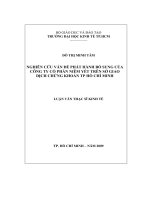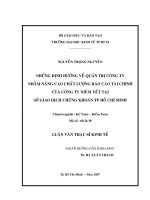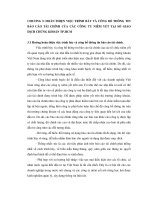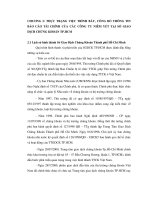Yet but so and hence
Bạn đang xem bản rút gọn của tài liệu. Xem và tải ngay bản đầy đủ của tài liệu tại đây (9.46 KB, 1 trang )
Yet, but, so, and hence
Yet
and
but
can both be used as conjunctions. In this case, they have very similar meanings. Note that
yet
leaves
a greater impact on the reader/listener because it indicates surprise.
Compare:
She was angry,
yet
she said nothing.
She was angry,
but
she said nothing.
Here the first statement suggests that the speaker was a bit surprised by her reaction.
But
, on the other hand, is
emotionally neutral.
Yet
can be preceded by
and
. This usually happens when
yet
comes at the beginning of a clause. Note that
but
cannot be preceded by
and
.
They were tired and hungry
and yet
they refused to give up.
OR
They were tired and hungry,
yet
they refused to give up.
So and hence
So
and
hence
have similar meanings, but the grammar is a bit different.
So
is mainly used in an informal style.
Hence
, on the other hand, is very formal.
We didn’t have enough money to buy the train tickets,
so
we cancelled the trip.
We didn’t have enough money to buy the train tickets;
hence
we cancelled the trip.
Note the semicolon.
Hence
is not a conjunction. It is a transitional adverb. It cannot connect two clauses. It merely
shows how the ideas are related.
Hence
, too, can be preceded by
and
. In this case, it acts like a conjunction.
We didn’t have enough money to buy the tickets
and hence
we cancelled the trip.
In informal English, we often begin a sentence with
so
. It is merely used to make a connection with what has been
said before.
‘I had lost the key,
so
I couldn’t open the door.’ ‘
So
what did you do?’ ‘Well, I …’
Be first to know when grammar rules change! Sign up to our newsletter here: englishgrammar.org (It's free)
Powered by TCPDF (www.tcpdf.org)









